This piece has been medically reviewed by Victor Marlar, MD, Medical Advisor to Aeroflow Diabetes.
Metformin— a drug prescribed to people diagnosed with type 2 diabetes— has gotten a lot of buzz lately.
Many diabetic patients believe Metformin is no longer safe to use and can cause long-term diabetes complications. However, others still hold true that it’s a miracle drug that is beneficial in controlling blood sugar levels, among other conditions.
Get the facts about Metformin, and hear from one of Aeroflow Urology’s board-certified endocrinologists in this post so you can manage your diabetes with confidence.
What Is Metformin?
Metformin— the most commonly prescribed diabetes drug used to treat type 2 diabetes— is a drug called a biguanide, which helps lower blood glucose levels.
Metformin was approved for use by the FDA in 1995 and is prescribed by healthcare professionals to help control blood sugar levels in those with type 2 diabetes by lowering the amount of sugar your body produces and absorbs.
Metformin decreases glucose production in your liver and lowers insulin sensitivity. When combined with a healthy diet and exercise, Metformin can lower blood sugar gradually for those with type 2 diabetes.
The drug has been proven to:
- Lower blood sugar for those with type 2 diabetes and other conditions.
- Treat pre-diabetes.
- Treat type 1 diabetes for some.
- Decrease risk of cardiovascular disease and cardiovascular events.
- Decrease the risk of a heart attack.
- Prevent stroke.
- Prevent death related to cardiovascular events.
Compared to insulin injections, glibenclamide, and chlorpropamide, Metformin is 30% more effective at reducing the risk of death and other complications in those with diabetes.


Healthcare providers and diabetic patients prefer Metformin over other diabetes medications to treat type 2 diabetes, not just because of its known benefits but also because it is affordable; In some states, Metformin is around $10 for a three-month supply.
Side Effects
Known side effects of Metformin include:
- Gastrointestinal issues, such as diarrhea and flatulence.
- Nausea or vomiting.
- Anemia (Vitamin B12 deficiency).
- Weight loss.
- Hypoglycemia (severe decrease in blood sugar levels).
- Lactic acidosis (lactic acid build up in the blood).
Other Benefits
Although Metformin is typically prescribed to treat high blood sugar in people with type 2 diabetes who cannot control their blood sugar with lifestyle changes alone, it is used outside of diabetic management programs. Metformin has been shown to do the following:
- Prevent death from COVID-19 in diabetic patients. In the clinical trial, which consisted of 283 diabetic patients who contracted COVID-19, 104 people took Metformin for a minimum of 3 days. The other 179 people were given other antibiotic drugs and no Metformin. The data concluded that those who took Metformin had a lower death rate from COVID-19 compared to those who only took antibiotic drugs.
- Prevent different forms of cancer. A study showed that people who took Metformin had a 62% lower risk of developing pancreatic cancer than those who did not. The study also showed that the medication might lower the risk of developing breast, prostate, ovarian, colon, and lung cancer. It’s believed that this is due to Metformin’s level of antioxidants.
- Lower the risk of Alzheimer’s disease. Metformin has been shown to lower people’s risk of developing dementia.
- Decrease the risk of stroke. One study showed that people with type 2 diabetes who took Metformin for 4 years had an 8.3% less chance of a stroke than those with type 2 diabetes who did not take the medication.
- Decrease the risk of Polycystic ovary syndrome (PCOS). PCOS, which causes ovarian cysts and high blood sugar levels in females, has been treated with Metformin due to its ability to lower blood sugar levels.
- Prevent heart problems. Studies have found that the drug protects against and prevents heart issues like heart failure.


What About the Metformin Recall?
Extended-release Metformin was recalled by the FDA in 2019 in other countries due to finding N-nitrosodimethylamine (NDMA) in the drug, which can, in any form, increase your risk of developing cancer if taken for an extended period.
However, after testing a quantity of extended-release forms of the drug in the US, NDMA was found to be at acceptable levels in Metformin in the US (acceptable levels are also in our water and food supplies, as well as other medications). No NDMA was found in the immediate-release forms of Metformin, so all other prescriptions were considered safe and not recalled.
To find out if your Metformin was recalled, visit the recall list on the FDA’s website.
If you find that your Metformin product was recalled, speak with your healthcare provider before stopping your medication to avoid serious diabetic complications.
So, Is Metformin Safe?
While the debate has carried on online and in diabetic healthcare professionals’ offices, only a handful of studies report that Metformin may have some serious side effects.
One study showed that Metformin might cause adverse effects on kidney function in some people with type 2 diabetes or moderate chronic kidney disease (CKD).
Another study reported that the benefits of Metformin were decreased in people who were exercising at recommended amounts and taking the drug for shorter periods.
A third study showed that users who took Metformin long-term (more than 60 prescriptions) were at an increased risk of developing Alzheimer’s disease.


Some of the most common misconceptions and valid concerns from those with diabetes are that Metformin can cause kidney and liver damage and cancer.
But it has been proven that Metformin does not cause damage to these organs or cancer.
Dr. Rich Marlar, a board-certified endocrinologist who specializes in diabetes and metabolism, says that some people have mistakenly assumed that they were taken off of Metformin because it was damaging their kidneys. “However,” says Marlar, “There is no evidence that Metformin is harmful to the kidneys– it just needs to be reduced or avoided if kidney function is significantly reduced (which is true for many medications).”
Marlar also states that while many people believe Metformin causes liver damage, the opposite is true: Metformin has been shown to be beneficial to patients with fatty liver disease-- the most common type of liver disease in people with type 2 diabetes.


Metformin has also been proven not to cause cancer; It actually does the opposite and can prevent different forms of it.
Healthcare professionals in the field of diabetes continue to prescribe Metformin as a safe and effective drug for diabetes treatment with the most concerning side effect being gastrointestinal issues, such as:
- Diarrhea
- Nausea
- Abdominal pain.
According to Marlar, these symptoms can be prevented by starting out at a low dose of Metformin (about 500mg once a day) and experimenting with immediate and extended-release forms of the medication to see which one helps people ease their gastrointestinal symptoms.
If you’re concerned about the side effects of Metformin, Marlar recommends speaking with your healthcare provider about the risks and benefits of the medication so you can make an informed decision about your diabetes treatment. He also says to keep in mind that the risks associated with diabetes are far greater than those associated with Metformin.
Manage Diabetes With Low-Cost CGMs
If you have type 2 or type 1 diabetes, taking Metformin is not your only option for managing your blood sugar levels.
Continuous glucose monitoring systems (CGMs) are an excellent way to check your blood glucose levels throughout the day. The best part is that you may be able to get them at a low cost through your insurance plan and Aeroflow Diabetes!
We supply and ship low-cost CGMs, like the FreeStyle Libre Systems and the Dexcom Systems, to those who qualify. All you need to do is fill out our quick application. It takes under 5 minutes and may save you hundreds of dollars in diabetes healthcare costs.
To see if you qualify today, fill out our Eligibility Form. If you are eligible, we’ll help you reach out to your healthcare provider for a prescription and then ship your CGM directly to your home. In addition, you’ll receive new devices when needed with the help of a text or email reminder.
Stopping metformin: Side effects, risks, and how to stop safely. (2020, June 17). Www.medicalnewstoday.com. https://www.medicalnewstoday.com/articles/323128#alternatives
10 Big Myths About Metformin, the Popular Diabetes Drug - GoodRx. (n.d.). GoodRx. https://www.goodrx.com/metformin/ten-myths-about-metformin
Cheng, C., Lin, C.-H., Tsai, Y.-W., Tsai, C.-J., Chou, P.-H., & Lan, T.-H. (2014). Type 2 diabetes and antidiabetic medications in relation to dementia diagnosis. The Journals of Gerontology. Series A, Biological Sciences and Medical Sciences, 69(10), 1299–1305. https://doi.org/10.1093/gerona/glu073
https://www.strokejournal.org/article/S1052-3057(13)00357-1/abstract
Li, D., Yeung, S. J., Hassan, M. M., Konopleva, M., & Abbruzzese, J. L. (2009). Antidiabetic Therapies Affect Risk of Pancreatic Cancer. Gastroenterology, 137(2), 482–488. https://doi.org/10.1053/j.gastro.2009.04.013
Office of Regulatory Affairs. (2019). Recalls, Market Withdrawals, & Safety Alerts. U.S. Food and Drug Administration. https://www.fda.gov/safety/recalls-market-withdrawals-safety-alerts
Long-Term Side Effects of Metformin: What Are the Risks? (n.d.). GoodRx. https://www.goodrx.com/metformin/long-term-side-effects-of-metformin-what-are-the-risks
Nasri, H., & Rafieian-Kopaei, M. (2014). Metformin: Current knowledge. Journal of Research in Medical Sciences : The Official Journal of Isfahan University of Medical Sciences, 19(7), 658–664. https://www.ncbi.nlm.nih.gov/pmc/articles/PMC4214027/
Nesti, L., & Natali, A. (2017). Metformin effects on the heart and the cardiovascular system: A review of experimental and clinical data. Nutrition, Metabolism and Cardiovascular Diseases, 27(8), 657–669. https://doi.org/10.1016/j.numecd.2017.04.009
Sharoff, C. G., Hagobian, T. A., Malin, S. K., Chipkin, S. R., Yu, H., Hirshman, M. F., Goodyear, L. J., & Braun, B. (2010). Combining short-term metformin treatment and one bout of exercise does not increase insulin action in insulin-resistant individuals. American Journal of Physiology - Endocrinology and Metabolism, 298(4), E815–E823. https://doi.org/10.1152/ajpendo.00517.2009
Hsu, W.-H., Hsiao, P.-J., Lin, P.-C., Chen, S.-C., Lee, M.-Y., & Shin, S.-J. (2017). Effect of metformin on kidney function in patients with type 2 diabetes mellitus and moderate chronic kidney disease. Oncotarget, 9(4), 5416–5423. https://doi.org/10.18632/oncotarget.23387
Luo, P., Qiu, L., Liu, Y., Liu, X., Zheng, J., Xue, H., Liu, W., Liu, D., & Li, J. (2020). Metformin Treatment Was Associated with Decreased Mortality in COVID-19 Patients with Diabetes in a Retrospective Analysis. The American Journal of Tropical Medicine and Hygiene, 103(1), 69–72. https://doi.org/10.4269/ajtmh.20-0375
Everything You Always Wanted to Know About Metformin, But Were Afraid to Ask. (2019, January 8). DiaTribe. https://diatribe.org/everything-you-always-wanted-know-about-metformin-were-afraid-ask#:~:text=How%20does%20metformin%20work%3F
Imfeld, P., Bodmer, M., Jick, S. S., & Meier, C. R. (2012). Metformin, Other Antidiabetic Drugs, and Risk of Alzheimer’s Disease: A Population-Based Case-Control Study. Journal of the American Geriatrics Society, 60(5), 916–921. https://doi.org/10.1111/j.1532-5415.2012.03916.x
Information provided on the Aeroflow Diabetes website is not intended as a substitute for medical advice or care from a healthcare professional. Aeroflow recommends consulting your healthcare provider if you are experiencing medical issues relating to diabetes care.









